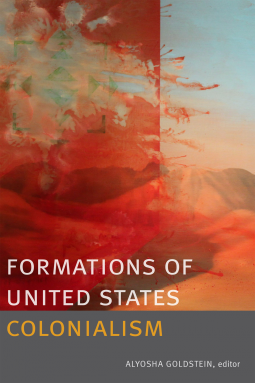Please wait... This may take a moment.
Formations of United States Colonialism
by Alyosha Goldstein, Editor
This title was previously available on NetGalley and is now archived.
Pub Date
Nov 10 2014
| Archive Date
Jan 07 2015
Description
Bridging the multiple histories and present-day iterations of U.S. settler colonialism in North America and its overseas imperialism in the Caribbean and the Pacific, the essays in this groundbreaking volume underscore the United States as a fluctuating constellation of geopolitical entities marked by overlapping and variable practices of colonization. By rethinking the intertwined experiences of Native Americans, Puerto Ricans, Chamorros, Filipinos, Hawaiians, Samoans, and others subjected to U.S. imperial rule, the contributors consider how the diversity of settler claims, territorial annexations, overseas occupations, and circuits of slavery and labor—along with their attendant forms of jurisprudence, racialization, and militarism—both facilitate and delimit the conditions of colonial dispossession. Drawing on the insights of critical indigenous and ethnic studies, postcolonial theory, critical geography, ethnography, and social history, this volume emphasizes the significance of U.S. colonialisms as a vital analytic framework for understanding how and why the United States is what it is today.
Bridging the multiple histories and present-day iterations of U.S. settler colonialism in North America and its overseas imperialism in the Caribbean and the Pacific, the essays in this...
Description
Bridging the multiple histories and present-day iterations of U.S. settler colonialism in North America and its overseas imperialism in the Caribbean and the Pacific, the essays in this groundbreaking volume underscore the United States as a fluctuating constellation of geopolitical entities marked by overlapping and variable practices of colonization. By rethinking the intertwined experiences of Native Americans, Puerto Ricans, Chamorros, Filipinos, Hawaiians, Samoans, and others subjected to U.S. imperial rule, the contributors consider how the diversity of settler claims, territorial annexations, overseas occupations, and circuits of slavery and labor—along with their attendant forms of jurisprudence, racialization, and militarism—both facilitate and delimit the conditions of colonial dispossession. Drawing on the insights of critical indigenous and ethnic studies, postcolonial theory, critical geography, ethnography, and social history, this volume emphasizes the significance of U.S. colonialisms as a vital analytic framework for understanding how and why the United States is what it is today.
Advance Praise
"This indispensable anthology makes a significant intervention in multiple fields by bridging what has often been seen as two separate processes, the consolidation of U.S. control over the continent and the rise of formal overseas interests at the end of the nineteenth century. The collected essays offer rich and substantive directions for future investigations to scholars interested in what American Indian and Indigenous studies bring to American studies and U.S. imperial studies."—Jodi A. Byrd, author of The Transit of Empire: Indigenous Critiques of Colonialism
"I can't think of an anthology published since Amy Kaplan and Donald Pease's
Cultures of United States Imperialism (1994) that so directly engages the question of colonialism and empire in American studies. What makes
Formations of United States Colonialism so distinctive is its deep grounding in Native American studies as the basis for a radical rethinking of the comparative study of U.S. empire, both on the North American continent and overseas."—
Chandan Reddy, author of Freedom with Violence: Race, Sexuality, and the US State
"This indispensable anthology makes a significant intervention in multiple fields by bridging what has often been seen as two separate processes, the consolidation of U.S. control over the continent...
Advance Praise
"This indispensable anthology makes a significant intervention in multiple fields by bridging what has often been seen as two separate processes, the consolidation of U.S. control over the continent and the rise of formal overseas interests at the end of the nineteenth century. The collected essays offer rich and substantive directions for future investigations to scholars interested in what American Indian and Indigenous studies bring to American studies and U.S. imperial studies."—Jodi A. Byrd, author of The Transit of Empire: Indigenous Critiques of Colonialism
"I can't think of an anthology published since Amy Kaplan and Donald Pease's
Cultures of United States Imperialism (1994) that so directly engages the question of colonialism and empire in American studies. What makes
Formations of United States Colonialism so distinctive is its deep grounding in Native American studies as the basis for a radical rethinking of the comparative study of U.S. empire, both on the North American continent and overseas."—
Chandan Reddy, author of Freedom with Violence: Race, Sexuality, and the US State
Marketing Plan
This book has many possibilities for course adoptions including American studies, Indigenous and Native American studies, Critical Ethnic studies, U.S. History, and Postcolonial studies.
This book has many possibilities for course adoptions including American studies, Indigenous and Native American studies, Critical Ethnic studies, U.S. History, and Postcolonial studies.
Available Editions
| EDITION |
Paperback |
| ISBN |
9780822358107 |
| PRICE |
$27.95 (USD)
|
Additional Information
Available Editions
| EDITION |
Paperback |
| ISBN |
9780822358107 |
| PRICE |
$27.95 (USD)
|
Average rating from 1 member




